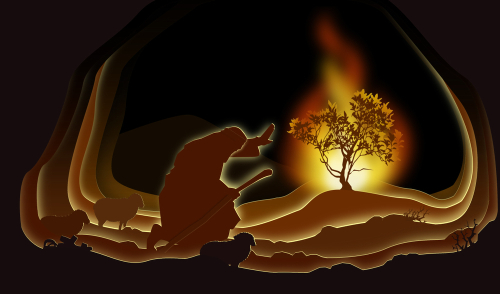Purpose.
A word that often troubles every human being at some point in their lives. Who am I? What am I meant to be doing? Why am I here?

Some are lucky and life leads them to an answer. Some just presume that the search for purpose is a phase in life and get over it. Most of us ignore the questions and make do with whatever life throws our way. We trudge through each day and each night, focused on getting to the next target before us. Graduate from university: Tick. Get a job and make money: Tick. Get married: Tick. Have children: Tick. On and on we go, until the voice that whispers “purpose, purpose, purpose” gets fainter and almost inaudible.
But it never really goes away. It’s there in the recesses of our consciousness, waiting for us to stumble upon it as we go through each day.
David’s early life was a life of service to others, family and flock.
Why doesn’t the voice ever just give up and go away forever? Why then is this seemingly unnoticed quality so important? We can answer this question by exploring the story of a popular biblical figure, David.
We’re mostly familiar with the gist about David. The young shepherd boy turned king, who slew Goliath and many other enemies of his people. A man with an affinity for the female form, a love for his people and a passion for God. Put simply, David loved life.
But it’s not David in his later years we’re interested in. It’s the David he was before his destiny exploded onto the national stage. We are told precious little about his early years, but we know he was a shepherd boy, the runt of the family and perhaps the least physically attractive of his many brothers. He tended the family flock and took food and supplies out to his brothers at the warfront. He was a carer – a lover, not a fighter. The things he did were different from what other men around him did and with that he developed qualities that other men around him couldn’t begin to muster.
When his flock was hungry, he led them to pastures where they could eat and drink, when lost he went in search of them and when in danger, he protected them – from lions, bears and other wild animals [1]1 Samuel 17:34-36. When he was at home, he was relied upon to ensure that his brothers who were at war were well taken care of and he didn’t think it beneath his estate to serve his family by serving them. [2]1 Samuel 17:17-18 David’s early life was a life of service to others, family and flock. Putting himself in harm’s way so that they might find relief and protection, and learning the patience that comes with leading others.
He knew who he was, what he could do and most of all what God could do through him.
In doing all these, the boy David acknowledged that it was God through him that was at work. It was not his own incredible ability or strength. Just God. [3]1 Samuel 17:37
All of these were qualities he required for the next level, the frontier to come: Goliath. You see, fighting Goliath was not his business, neither was the reputation of the armies of God a thing he was trained to defend. That was for his brothers and their comrades. In fact, it was the responsibility of the king to lead the charge. But unfortunately, neither king nor Cavalry had what was needed to defeat Goliath. Only David did.
And what were those qualities again? The ability to care for the well-being of another, the courage to defend the defenseless and the strength that came from knowing that with God, he could do anything. So, when he heard Goliath’s taunts and saw that the army was struck motionless in the grip of fear, he stood up. [4]1 Samuel 17:23-24 When he realised that the lives of his brothers and possibly the entire nation were in danger, his instinct to protect kicked in. When he realised that the nation needed someone willing and able to sacrifice their lives for their safety, his desire to serve was aroused. When he heard the name of the God he loved, trusted and relied upon being dragged in the mud, he knew it was an easy win. Why? Because God would have to help on this one. He wasn’t fighting just for himself, or for animals this time. He was fighting for God and God who empowered him to kill wild animals to protect flock in his care, would not be reluctant to grant victory over an army that was intimidating his people and insulting his name. The spoils of war promised to the man who defended Israel from Goliath were merely an added bonus!
How our abilities impact the other is where purpose is nested.
What was most amazing about this young lad David was not just that he had all these qualities, it was that he knew he had them. He knew who he was, what he could do and most of all what God could do through him. Let’s read what he said when Saul offered him his armour to go into battle with Goliath.
“Then Saul clothed David with his armor. He put a helmet of bronze on his head and clothed him with a coat of mail, and David strapped his sword over his armor. And he tried in vain to go, for he had not tested them. Then David said to Saul, “I cannot go with these, for I have not tested them.” So David put them off.” [5]1 Samuel 18:38-39
David’s response was that of a person who was so confident in who he was, what he had and what God could do through him that he did not entertain the suggestions that (a) he couldn’t do this and (b) he needed something extra to get the work done.
You see my friends, that is purpose. Purpose is not just a destination, an event in our lives or a position we are meant to occupy. Purpose is a doing, a being. Purpose is you in action. Purpose is knowing what you can do, how, where, when and actually doing it. As a result, one’s purpose can only truly be realised by how it is applied in the lives of others or in situations external to the self. How our abilities impact the other is where purpose is nested and it is in making more of that impact that we grow to become who we were created to be.
Everything we require to walk in our purpose is already in us.
When reminding Gideon of who he was, the angel didn’t call him the ‘leader of the army of Israel’ even though that was what he was going to do. The angel called Gideon a ‘mighty man of valour’, a description of qualities that Gideon had and could use in any given situation, should he wish. [6]Judges 6:12 Qualities that God needed him to exercise for his people at that time. When speaking to Moses at the burning bush, the Lord told him of what he was called to do for him and not what position he was going to occupy. [7]Exodus 3:10 Moses’ purpose lay in his going to Egypt to negotiate the freedom of a slave nation, not in the role of ‘President’ or ‘Prime Minister.’
Everything we require to walk in our purpose is already in us. Who we are and what we can do to live in our purpose are already hardwired into our DNA. All we have to do is realise this and do it. It starts with some introspection and an understanding that we are created with inherent skills and abilities by a God who has called us ‘good’.


